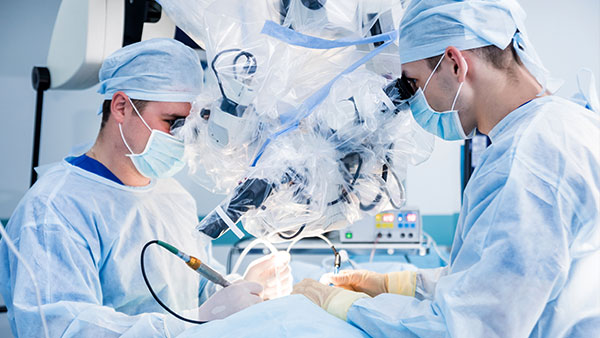Spine Surgery
Spine Surgery
Conditions that may be effectively addressed through spinal surgery include:
Degenerative disc disease
This condition occurs when the rubbery, shock-absorbing discs between the vertebrae in the spine begin to shrink as a result of aging, injury or overuse. If these discs completely collapse, the joints in the vertebrae may begin to scrape against one another, resulting in pain and stiffness.
Low back pain
Pain in the low back may be caused by degenerative wearing down of the spine, injuries, overuse or repetitive motions. The pain may range in severity and can be ongoing or occur intermittently.
Spinal stenosis
This condition develops when a narrowing of the space around the spinal column occurs, putting pressure on the spinal cord and spinal nerves. As a result, numbness, pain and weakness in the legs may develop.
Spine Surgery… What Can I Expect?
Will I be in pain after spine surgery?
How long will I be in hospital following spine surgery?
Where will my incision be?
Will I have a scar?
What medications will I need to take during my hospital stay?
What medications will I need to stop before my surgery?
What radiology scans will I need to have?
Will I need rehabilitation?
What are the risks of having spine surgery?
Risks of Anesthesia
Risks of anesthesia will be discussed with you by your anesthetists prior to surgery. It is important that you inform us of your correct age and any past medical problems, as this can influence the risk of anesthesia. Risks include:
- Heart problems, such as heart attack (AMI) or arrhythmia
- Lung problems, such as infection (pneumonia) or blood clots
- Urinary tract infection
- Deep Venous Thrombosis (DVT)
- Eye or visual problems
- Pressure wounds
- Stroke
General Risks of Spine Surgery
Although surgery is generally safe, there are some risks whenever performing a craniotomy. These include:
- Infection 1-2%
- Bleeding. This can occur at the time of surgery and may necessitate a blood transfusion. It can also occur at some time after surgery.
- Spine fluid leak (CSF leak)
- Small risk of significant neurological injury causing paralysis
- Chronic pain


